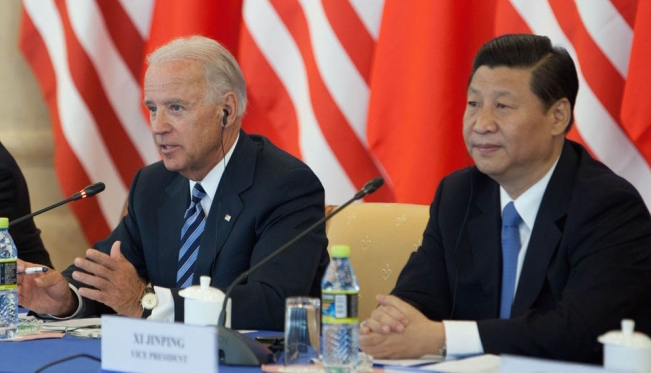This past weekend U.S. President Joe Biden sent a naval group headed by aircraft carrier USS Theodore Roosevelt into the South China Sea. Officially, the military action was to promote “freedom of the seas.” In reality, it was a show of force on the part of the incoming administration.
The military exercise was designed for domestic approval as well as to warn the Chinese authorities the new U.S. president is paying attention to their overflights of Taiwan.
Biden sees national unity as a main objective. Identifying an external enemy is a classic means used by imperial powers to scare people into closing ranks: witness the U.S. Cold War with Russia.
Driven by the bipartisan U.S. foreign policy establishment, American policy towards China has been moving from “constructive engagement” when Bill Clinton was president — 1993 to 2001 — to an era of “strategic competition” which will continue with Biden in the White House.
The constructive engagement policy was aimed at bringing China to adopt World Trade Organization (WTO) practices. Protection for intellectual property rights (a.k.a. putting monopoly profits ahead of the public interest, as with COVID-19 vaccines) was among the rules U.S. corporate capitalists had championed at the WTO.
Right-wing populist Republicans pointed to the impressive economic success of China as being at the expense of the U.S. and engineered thanks to the Democrats backing the entry of China into the WTO.
China was also understood to be a competitor — not just a trading partner — and the Obama-Biden administration, in office from 2009 to 2017, orchestrated a “pivot to China” policy to deal with its rapid economic rise.
The pivot announced by then secretary of state Hillary Clinton was optimistically designed to move money and resources away from the war zones of Afghanistan and Iraq, and to “contain” China with military and economic measures.
The main upshot of the pivot was to drive China back into close relations with Russia, despite the long-standing U.S. policy imperative to keep the two great powers apart.
Under Obama, the U.S. envisaged a regional economic bloc: the Trans-Pacific Partnership, designed to encircle China with a coalition of democracies; but former president Trump walked away from the deal.
China reacted to the failed pivot by negotiating its own pact with Japan, South Korea, Australia, and other Southeast Asian nations, but not India. The Regional Comprehensive Economic Partnership was signed this past November, just as Biden was being elected U.S. president.
China was also able to forge a commercial pact with the European Union, which has been wary of negotiating a trade deal with the U.S.
Kurt Campbell, the architect of the pivot under Hillary Clinton, has joined the National Security Council in the Biden White House, taking a lead role on policy for Asia.
Campbell is on the record as supporting a military build-up to support the pivot to China, which, as he argues, has both a military security and economic dimension.
An aggressive, belligerent U.S. approach to China is not supposed to exclude co-operation on climate or the pandemic. It will include pressuring China on its human rights abuses against Xinjiang’s Muslims.
Canada, France, the U.K., and other U.S. trading partners and NATO allies are going to be lobbied to join the U.S. in aggressively countering China militarily — and on trade, commercial practices, technology, investment, and human rights.
Revving up strategic competition may make sense to a U.S. leadership which thinks it won the Cold War with Russia and expects to win another great victory by blocking the rise of China. This is not a good enough reason for Canada or other countries to join them.
In his inauguration address Biden had only a few sentences about foreign policy. His main preoccupations were domestic issues: the pandemic, climate, re-invigorating government, and better rewarding work.
The “we must deal with pressing issues first” approach the Biden administration has adopted domestically could also work for the U.S. internationally.
Canada should be working with a broad coalition to urge the U.S. to identify global issues and act jointly with others, including China, to address common concerns: global health and vaccine availability, fossil fuels and climate, renewable energy and the environment, refugees and migration, arms control and military spending reduction, inequality and poverty, and re-distribution of wealth and global taxation.
The U.S. may wish to remain the only superpower, but the experience of the last four years has revealed conclusively the shortcomings of waiting for the U.S. to show the way.
Clearly, shared power multilaterally offers Canada and other countries a better opportunity to deal with the challenges to human existence we face together now instead of joining the U.S. in a cold war with China so as to preserve American hegemony.
Duncan Cameron is president emeritus of rabble.ca and writes a weekly column on politics and current affairs.
Image credit: David Lienemann/Wikimedia Commons



